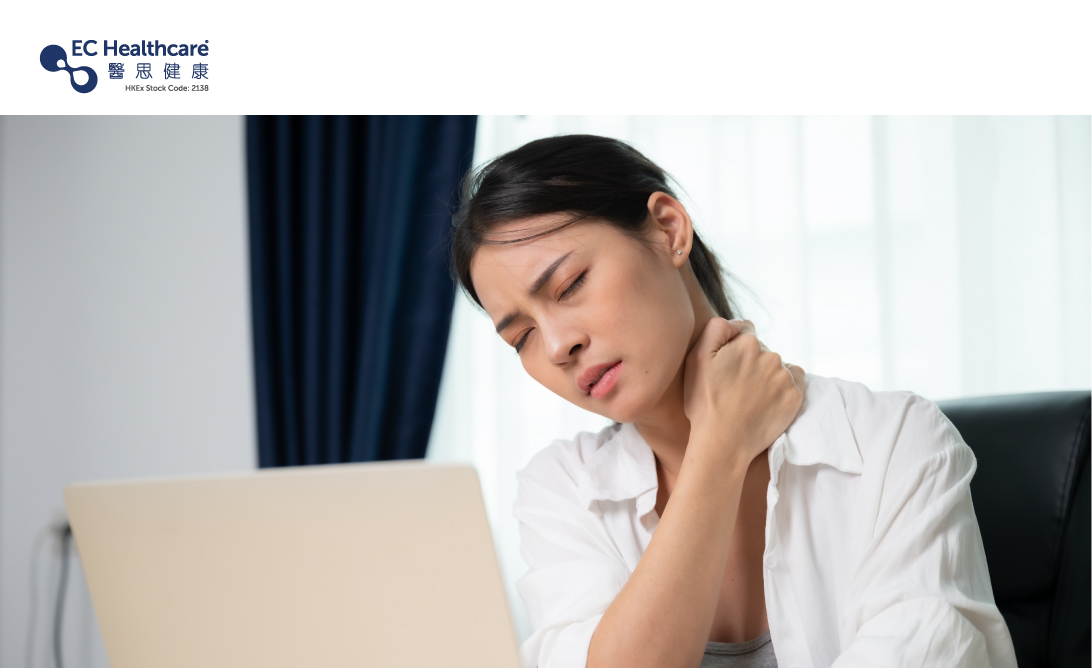Healthy Living | Frequently Experiencing Shoulder and Neck Pain? Chiropractor: Hunched Shoulders and Sleeping Habits Can Lead to Trapezius Syndrome


Are you frequently bothered by shoulder and neck pain? It's common among office workers! If you often experience pain in the head, neck, shoulders, and upper back, you may be suffering from Trapezius Syndrome. What exactly is Trapezius Syndrome? What are its symptoms and treatment options? How can you relieve tightness in the shoulder and neck muscles? In this article, chiropractor Yau Hoi Ying, as featured in the Business Times, sheds light on these issues for our readers.
Healthy Living | What is Trapezius Syndrome?
According to chiropractor Yau Hoi Ying, Trapezius Syndrome refers to head, neck, shoulder, and upper back pain caused by tension or dysfunction in the trapezius muscle. Yau Hoi Ying explains that the trapezius muscle can be divided into three regions: upper, middle, and lower. These regions connect the neck, shoulders, and upper back, including the occipital bone, cervical vertebrae, clavicle, scapula, and thoracic vertebrae. Its functions include stabilizing and mobilizing the shoulder blades, as well as assisting in tilting the head up and sideways movement of the neck.
Commonly Affected Region of Trapezius Muscle in Trapezius Syndrome
The activity of the trapezius muscle is controlled by the eleventh cranial nerve (Accessory Nerve), while the sensory function of the trapezius muscle is governed by the third and fourth cervical nerves. The most common issues related to the trapezius muscle tend to occur in the upper region.
Causes of Trapezius Syndrome
Trapezius issues commonly develop over time due to various factors. The causes of trapezius pain can include misalignment of the cervical vertebrae, loss of the natural curvature of the neck, trigger points within the trapezius muscle, and trapezius muscle spasms. These conditions often arise from poor posture or repetitive movements in daily activities. While less common, traumas or injuries can also be a contributing factor.
Who is More Susceptible to Developing Trapezius Syndrome? What are the Symptoms?
According to Yau Hoi Ying, common sufferers of Trapezius Syndrome include individuals who frequently look down (such as computer users), those with a habit of shrugging shoulders, people who sleep in a prone position, individuals experiencing high levels of life stress, and athletes involved in overhead sports. Symptoms of Trapezius Syndrome may include tightness and tension in the shoulder and neck area, shoulder pain, neck pain, upper to middle back pain, and headaches.
Does Trapezius Syndrome Cause Other Problems? Is Regular Massage Effective?
In addition to causing prominent shoulder and arm pain, Trapezius Syndrome can also result in poor posture, such as rounded shoulders, forward head posture, and a hunched back. These conditions can restrict the range of motion and movement in the neck and shoulder area. Yau Hoi Ying explains that regular massages or using massage guns can provide temporary and short-term relief. However, the pain often returns after a while.
Are Posture Corrector Braces Effective?
Trapezius Syndrome often develops due to poor posture, and there are recommendations online for posture corrector braces. Are they effective? According to Yau Hoi Ying, posture corrector braces or hunchback belts are not designed to correct spinal alignment. Their primary function is to provide support to the shoulders and assist patients in maintaining an upright posture. They are not intended for treatment purposes but can serve as a reminder to maintain good posture. However, Yau Hoi Ying advises caution when using these braces, as they should not be worn too tightly, which could affect blood circulation. Additionally, excessive reliance on posture corrector braces should be avoided.
Does Sleeping Position Significantly Affect Symptom Severity?
Yau Hoi Ying states, "Sleeping position definitely has an impact. Sleeping on your stomach is a very poor sleeping position. When sleeping on the stomach, our heads are usually turned to one side to facilitate breathing. However, maintaining this position for an extended period can cause tension in the trapezius muscle. Sleeping on your back or side is generally considered healthier sleeping position.

Related Brands


